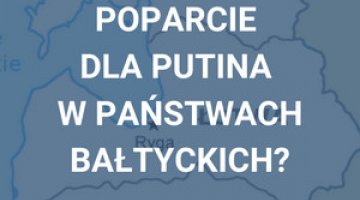Analyses
Lithuania is consistently working more closely with Belarus
The visit paid by Lithuanian Presdident Dalia Grybauskaite to Minsk on 20 October, during the presidential election campaign in Belarus, showed Lithuania's determination to maintain close ties with Belarus. Although successive Lithuanian authorities have expressed negative opinions about Lukashenko's regime and supported the opposition in Belarus for years, they have on the other hand criticised the EU's policy of imposing restrictions on Belarus and keeping Minsk in isolation. Vilnius tried to develop contacts with Belarus, but it was the lifting of EU sanctions in 2008 and Lukashenko's interest in opening up to the West that allowed the Lithuanian govenrment to intensify these relations. This new stage was launched by Lukashenko's visit to Vilnius in September 2009, followed by further meetings between officials from the two countries.
The key elements in the cooperation between Belarus and Lithuania are transit and energy. Lithuania, with its large seaport in Klaipeda and transit infrastructure, is particularly interested in winning Belarus as a stable partner, especially when Lukashenko signs long-term contracts for oil supplies from Venezuela, and like Lithuania. is keen to secure LNG transported by sea. The Lithuanian authorities are forced to seek favours from their Belarusian partner as Klaipeda competes with other Baltic seaports (in Latvia and Estonia). In order to maintain Belarus' interest in Lithuania's offer of economic cooperation, Lithuania is extending its offer to political support, and acting as an intermediary in establishing closer relations between Minsk and Brussels.
For Lukashenko, who is seeking both political and economic backing in the face of his aggravated conflict with Russia, dialogue with Lithuania and support from the Lithuanian president (a former EU commissioner) are particularly advantageous. However, there is no balance in the relations between these countries: Lithuania is taking a risk by siding with the Belarusian president without any guarantee of future economic profits, and assuming that its political support will lead to the prestigious success of bringing democratisation to Belarus. On the other hand, Lukashenko is convinced that by simply maintaining the hopes of closer ties with Lithuania, he will be able to seek its support whenever it is helpful for him.
A year of cooperation summed up, and hopes for the future
In March 2010, before the twentieth anniversary of Lithuania regaining independence, Belarus made a symbolic political gesture to Lithuania that proved the two countries have been successful even in settling thorny issues. Following the commitment that President Lukashenko made during his visit to Vilnius in September 2009, the Belarusian authorities handed Lithuania the protocol from the investigation of General Uladzimir Uskhopchyk, who on 13 January 1991 commanded the Vilnius regiment of the Soviet Army and, at Moscow’s orders, brutally pacified the mass independence demonstrations taking place then in Lithuania.
The rapprochement between these two countries has contributed to the development of economic cooperation. In Lithuania influential business circles, grouped around the Lithuanian Confederation of Industrialists and its leader Bronislovas Lubys, are particularly interested in it. Lithuanian entrepreneurs see an opportunity in the progressive liberalisation of the Belarusian market, and despite the crisis are relying on it more and more. In 2009 Lithuanian investments doubled in comparison with 2008, and reached US$150 million. Lithuania is currently the seventh largest foreign investor in Belarus, and has a positive trade balance in its trade with Belarus. Lithuania's important objective in its relations with Belarus remains the transit of cheap Ukrainian electric energy through Belarus to Lithuania, which was strongly emphasised by President Grybauskaite during her visit to Minsk.
The gas crisis between Russia and Belarus, together with Minsk's determination to seek alternative to Russian suppliers and new ways of receiving supplies, has however opened up further opportunities for collaboration. In June 2010, the Prime Ministers of both countries established an intergovernmental working group on economic cooperation in the energy field. On 7 October, this group elaborated an agreement on the transit of Venezuelan oil to Belarus through the Lithuanian state-owned oil terminal in Klaipeda (5 million tonnes of oil within two years) and the transit of oil by train to the Belarusian refinery in Novopolotsk. The conclusion of agreements between the companies from both countries that service this contract will lead to Belarus' economic ties with the seaport and terminal in Klaipeda being strengthened. Above all, it is influential Lithuanian business circles that are interested in increasing the importance of Lithuania as a transit country (Lubys controls part of the Klaipeda seaport). Lithuania is considering the prospects of collaboration with Belarus while preparing a project for an LNG terminal in Klaipeda which will ensure supplies of gas to Lithuania, and could also be used by Belarus. Although Lithuania has strengthened its relations with Minsk, Vilnius has no guarantee that the planned economic initiatives will bring the expected profits. On one hand, the Belarusian government appears interested in cooperation, but on the other, they have set tough conditions that include cheap fees for the transit of oil. Belarus may also present the argument that it has an alternative transit route, as it is talking to Latvian partners about the possibility of using the oil terminal in Vindava. In such conditions Lithuania is forced to retain Minsk's interest by extending its offer to political cooperation, in order to attain visible results in its policy of opening up to Belarus.
Supporting Lukashenko without precise conditions
President Grybauskaite went to Minsk even though this decision was criticised both in Lithuania and in opposition circles in Belarus. It was said that the visit would become an instrument in the electoral campaign of the Belarusian dictator, particularly after a wave of negative propaganda against Lukashenko in the Russian media. Grybauskaite's visit to Belarus was officially justified by the necessity of Lithuania's preparation for leadership in the Organisation for Security and Co-operation in Europe the following year, which would in turn lead to the necessity of monitoring the election of the Belarusian president in the forthcoming elections scheduled for 19 December.
Dalia Grybauskaite also brought to Minsk a Lithuanian proposal to advocate and defend Belarus' interests in Europe. For Lukashenko these assurances were important, particularly the fact that they were formulated by a former EU commissioner who enjoyed a good reputation in Brussels. Lukashenko has been pleased by this gesture, and expects that Grybauskaite's support can be of use to him if he has to break the resistance of those EU states and institutions which have not seen any chance of constructive dialogue with him. Furthermore, the Lithuanian declarations have not been publicly accompanied by any firm and specific conditions. Lithuania is hoping that Belarus will use its support in the EU and will take the steps awaited by the international community. By not placing any conditions on its support, Lithuania may place itself in a difficult situation. More serious irregularities in the election process may jeopardise the partnership between Lithuania and Belarus and bring Lithuania under fire from international criticism. Also, relations between the Lithuanian government and the Belarusian opposition, which has not felt the strong support from Lithuania as it did earlier, may grow more distant. During President Grybauskaite's visit, Lukashenko only declared that the registration of all candidates in the election would be held in a regular and transparent way, and international observers would be granted access to election commissions. During the visit, an agreement on small-scale border traffic between Lithuania and Belarus was signed, which covers visa-free circulation in the near-border area of up to 50 km inside the territories of each country. Lithuania is the third country after Poland and Latvia to sign such an agreement with Belarus. Now this agreement needs to be accepted by the European Commission (which thus has to agree to extend the area from 30 km to 50 km) and then ratified by the parliaments of both countries.
Summary
In the short term, Lukashenko needs political and economic support from Vilnius against the background of the escalating conflict with Russia. In this context, the Lithuanian president’s visit could alleviate the effects in both Belarus and the EU of the anti-Lukashenko campaign which the Russian media is currently conducting. With a further deterioration of relations with Russia, Lithuania's help in the energy sphere may contribute to Belarus' increased energy security, by securing the transit route for Venezuelan oil and possibly for gas through the LNG terminal. Energy projects bear risks, though, and political gestures in a situation where there are no positive changes in Belarus could mean the failure of Vilnius’ policy towards Belarus. This is now de facto the strongest direction in Lithuania's eastern policy, and failure would affect Lithuania's image in the EU.
Through the support pledged to Minsk in its conflict with Moscow, Lithuania is also running the risk that its own relations with Russia could become more distant. Dalia Grybauskaite's election for the presidency was greeted with high hopes in Russia. However, despite some gestures that showed Russia was ready to work on the ‘new opening’ with Grybauskaite, these plans were not put into practice, and the announced visit of Grybauskaite to Moscow has not taken place. Lithuania's closer ties with Belarus during the intensified dispute between Minsk and Moscow may lead to a situation where, although Belarus will remain the major partner for Lithuania in the area of eastern policy, Vilnius' position in the region will be weakened.




